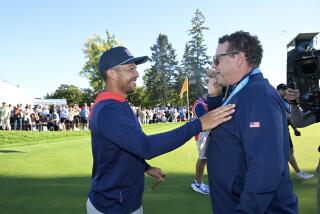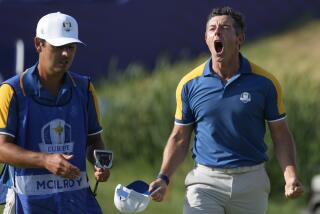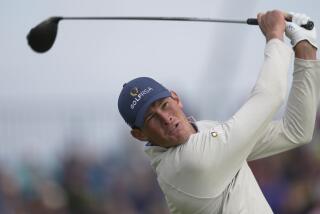Ryder Cup : Strange, Stewart Fail, So U.S. Trails by 2
- Share via
SUTTON COLDFIELD, England — In a less than brilliant debut Friday as the non-playing captain of the U.S. team in the Ryder Cup, Ray Floyd’s strategy was questioned. Even by Ray Floyd. So, he changed it Saturday.
But it was like Casey Stengel once said of his Amazin’ Mets: “I managed good, but they played bad.”
Short of taking his own clubs onto The Belfry, there was not much more Floyd could have done for his team’s chances than to arrange for two-time U.S. Open champion Curtis Strange and PGA champion Payne Stewart to be on the course together with a chance to tie the match against the unheralded English pair of Howard Clark and Mark James.
Or is it Howard James and Mark Clark?
Whichever European pair was paired against Strange and Stewart, with the possible exception of Spaniards Seve Ballesteros and Jose-Maria Olazabol, Floyd expected a victory Saturday afternoon. But in a dramatic finish to a superb day of golf played before 27,000 spectators, Strange and Stewart failed to come through.
So did Floyd’s previously reliable team of British Open champion Mark Calcavecchia and Ken Green, but they were paired against the irrepressible Ballesteros and Olazabol.
As a result, the United States is still two points behind Europe entering the final 18 holes of the three-day competition. It could have been worse for the United States if not for the exceptional play Saturday of three of its Ryder Cup rookies, Paul Azinger, Chip Beck and Mark McCumber.
Azinger was so impressive that he earned a head-to-head match today against Ballesteros. Perhaps, it was suggested to Azinger, he should have been a little less conspicuous. But he would hear none of it.
“I’m psyched,” he said Saturday after teaming with Beck to play 32 holes in a remarkable 17 under par. “We’re all psyched. We don’t want to lose one match tomorrow.
“The Europeans are good, just not as good as us. I think they know how much stronger we are as individuals.”
In other words, it is time to get serious after four rounds in two days of alternate-shot and best-ball matches that the hackers at the local municipal course would be embarrassed to play. Today, it is mano-a-mano , the United States’ 12 best against Europe’s 12 best in 18 holes of individual match play.
If the United States indeed does win all 12 pairings, or even eight of them, it will regain the trophy that it has not held since 1985. The United States won 21 of the first 25 biennial competitions, but for the first time since Ryder Cup play began in 1927 has now lost two in a row.
With a 9-7 lead in matches, Europe needs only 5 1/2 points for its third consecutive victory. One point is scored for each victory, a half-point for each tie. Europe can retain the trophy with five more points for a tie.
It could be close enough to come down to the final three pairings, Tom Watson against Scotland’s Sam Torrance, Lanny Wadkins against England’s Nick Faldo and Strange against Scotland’s Ian Woosnam.
Close is about as much as the United States could have asked for after Friday’s debacle, when it lost all four best-ball matches in the afternoon to trail by two points.
Such was Europe’s domination Friday afternoon that the United States considered it a victory to earn a split Saturday.
The United States led, 3-1, after Friday morning’s alternate-shot matches, but Floyd changed his pairings for the afternoon’s best-ball play because of a commitment to his players to use all 12 of them each day. Europe’s non-playing captain, Tony Jacklin, kept his strongest teams together and was rewarded.
Asked about the strategy Friday, Floyd said that there is more to the Ryder Cup than just winning or losing.
Perhaps he determined overnight that there was more to the Ryder Cup than just losing.
Or perhaps it was in the alternate-shot play Saturday morning, when Azinger and Beck teamed to beat the Scots, Gordon Brand Jr. and Torrance, 4 and 3. In that round, Azinger and Beck had six birdies.
Floyd, nobody’s fool, decided to send them back onto the course for the best-ball matches in the afternoon. But if he still wanted to use each of his players, he would have to break up Calcavecchia and Green or sit down Strange and Stewart.
Watson made it easy for Floyd. One of two wild-card selections to the team, Watson proved his worthiness Friday morning by teaming with Beck to tie Ballesteros and Olazabol. That is the only time the Americans have even been in the same time zone with the Spaniards. But Watson fell apart Friday afternoon. After sitting out Saturday morning, he told Floyd that he could use more work on the practice tee in the afternoon. The others who did not play Saturday morning, Mark O’Meara, Fred Couples and Mark McCumber, also volunteered for benching in the afternoon.
Floyd took all of them up on it except for McCumber, who was paired with Tom Kite. That was inspired.
Kite is a steady player who usually is on the green in regulation. McCumber is a gambler. With little pressure on him in best-ball play because he knew that Kite would cover him, McCumber went for every pin and finished with five birdies and an eagle. He and Kite beat West German Bernhard Langer and Spaniard Jose-Maria Canizares, 2 and 1.
“I fell into a tremendous golf trance,” McCumber said.
Favorites of the English crowd and almost as effective as a team as Ballesteros and Olazabol, Woosnam and Faldo drew the assignment against Beck and Azinger.
Azinger considered that a “grudge match.” He led the British Open two years ago until he bogied the final two holes and lost to Faldo. That was not Faldo’s fault, but players on both sides of the Atlantic do not have to look for reasons to dislike him. Because of his aloof personality, this year’s Masters champion is not considered one of the gang.
Faldo and Woosnam had nine birdies Saturday afternoon, but Azinger and Beck had 11 and won the match, 2 and 1.
“Faldo and Woosie ran into some unbelievable golf,” Jacklin said. “All you can do in that situation is put out your hand and say, ‘Well played, men.’ You can’t beat that.”
That is the way Calcavecchia and Green must have felt. They won, 3 and 2, in the morning against Ronan Rafferty of Northern Ireland and Christy O’Connor Jr. of Ireland. But Ballesteros and Olazabol are a different matter.
After their tie Friday against Watson and Beck, they won their next match, 6 and 5, and then beat the strong twosome of Kite and Strange by one hole Saturday morning. With seven birdies in 16 holes, they beat Calcavecchia and Green, 4 and 2.
But Floyd felt comfortable. He still had Strange and Stewart on the course against Clark and James. If Strange and Stewart won, as expected, the United States would be tied with Europe entering today’s individual matches. If Clark and James won, Europe would retain its two-point lead.
Clark and James led early by two holes, but Strange and Stewart overtook them at the 10th. Their lead was still one after Strange’s 25-foot birdie putt at the 15th. But Clark birdied the next hole to tie.
Although they were unable to put distance between themselves and the Englishmen, Strange and Stewart were not playing poorly. At that point, they were six-under par. When he should have been tiring after playing all four rounds for the United States, Strange had back-to-back birdies on the 14th and 15th. Calcavecchia is the only other American who has not had a rest.
But then came the par-five 17th, which may be remembered as the Americans’ undoing in this Ryder Cup. It certainly was for Strange and Stewart.
With open second shots to the green after fine drives, both hit five-wood shots into the bushes to the left of the green.
Jacklin said that he believed they felt the pressure.
Floyd said that he believed they were too aggressive, “trying to thread the eye of a needle with a dart.”
Whatever, both hit their next shots into the bunker and were out of the hole. James birdied to give himself and Clark a one-shot edge going into the par-four 18th.
Needing a birdie, Strange had the best approach to the final green. But when his ball hit the slope and trickled back toward the fringe, the crowd, highly-partisan but not particularly disrespectful, could not hold back a roar. The Englishmen made an easy par for the victory.
“They played very poor shots, and that’s all I can say,” Floyd said of the second shots by Strange and Stewart on the 17th. “We’ve got two players in the fairway with a green that has an easy, open front, and both put themselves in virtually unplayable situations.
“That’s what wins or loses Ryder Cups. You’ve got to perform when the pressure is on.”
Because Strange and Stewart did not do that Saturday afternoon, the pressure is on the United States more than ever today.
“We’ve got to start taking this personally,” Azinger said.
More to Read
Go beyond the scoreboard
Get the latest on L.A.'s teams in the daily Sports Report newsletter.
You may occasionally receive promotional content from the Los Angeles Times.










